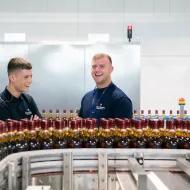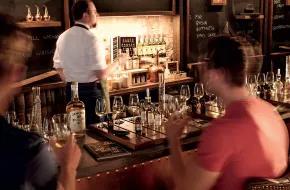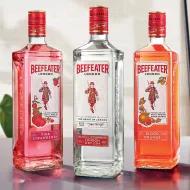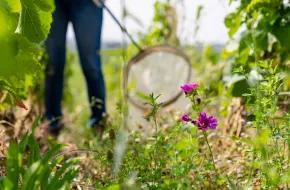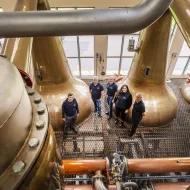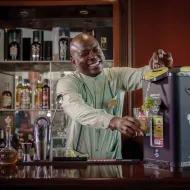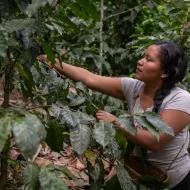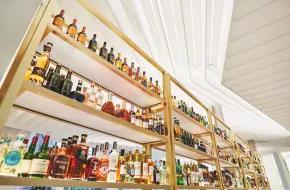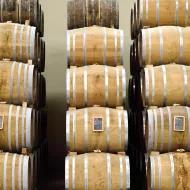EXCELLENT FY19, DEMONSTRATING CLEAR BUSINESS ACCELERATION:
+6.0% ORGANIC SALES GROWTH (+5.3% REPORTED)
+8.7% ORGANIC GROWTH IN PRO1 (+9.5% REPORTED)
FY20 GUIDANCE: ORGANIC GROWTH IN PRO BETWEEN +5% AND +7%
FINANCIAL POLICY INFLECTION:
DIVIDEND INCREASED TO €3.12/SHARE (50% PAYOUT) FROM FY19
€1BN SHARE BUY-BACK PROGRAMME ACROSS FY20 AND FY21
EXCELLENT FY19, DEMONSTRATING CLEAR BUSINESS ACCELERATION:
+6.0% ORGANIC SALES GROWTH (+5.3% REPORTED)
+8.7% ORGANIC GROWTH IN PRO1 (+9.5% REPORTED)
FY20 GUIDANCE: ORGANIC GROWTH IN PRO BETWEEN +5% AND +7%
FINANCIAL POLICY INFLECTION:
DIVIDEND INCREASED TO €3.12/SHARE (50% PAYOUT) FROM FY19
€1BN SHARE BUY-BACK PROGRAMME ACROSS FY20 AND FY21
SALES
Sales for FY19 totalled €9,182m, with very strong organic growth at +6.0% (+5.3% reported) and continued development of Must-win markets:
- USA: Sell-out broadly in line with market2 and strengthening of route-to-market;
- China: +21%, excellent performance thanks to continued strong dynamism of Martell and growth relays;
- India: +20%, with continued expansion of Seagram’s Indian whiskies and Strategic International Brands;
- Travel Retail: +6%, strong growth driven by all regions.
Regionally, FY19 Sales were driven mainly by Asia:
- Americas: +2%, acceleration in Canada, strong growth in Latam and Sell-out broadly in line with market in USA, but Sales dampened by USA wholesaler inventory optimisation;
- Asia-Rest of World: +12%, strong acceleration driven mainly by China, India and Turkey and continued strong growth in Japan
- Europe: +1%, slight growth in contrasted environment, with continued strong growth in Eastern Europe partly offset by Western Europe (difficult market in France and commercial disputes.)
Pernod Ricard continued to leverage its premium portfolio. There was strong growth across all key spirits categories:
- Strategic International Brands: +7%, continued strong growth, notably on Jameson, with acceleration on Martell and Scotch, dampened by impact of USA wholesaler inventory management
- Strategic Local Brands: +12%, acceleration driven by Seagram’s Indian Whiskies
- Specialty Brands: +12%, continued strong momentum, particularly for Lillet, Altos, Monkey 47, Ultra premium Irish Whiskey range and Smooth Ambler
- Strategic Wines: -5%, due to value strategy in UK and USA inventory management
- Innovation: contributing c.25% of Group topline growth, in particular thanks to Martell Blue Swift, Chivas XV, Beefeater Pink, Lillet and Monkey 47
Q4 Sales were €1,994m, +5% organic growth (+7% reported), with the continuation of dynamic growth dampened by USA wholesaler inventory management.
RESULTS
Wartość PRO1 w roku obrotowym 2019 wyniosła 2,581 mln EUR, co oznacza organiczny wzrost o +8.7% i +9.5% w sprawozdaniu. Marża PRO uległa organicznemu zwiększeniu o +74 punktów bazowych (+108 p. b. w sprawozdaniu głównie ze względu na dodatnie różnice kursowe o wartości +25 mln EUR).
FY19 PRO1 was €2,581m, with organic growth of +8.7% and +9.5% reported. The PRO margin expanded by +74bps organically (+108bps on a reported basis mainly due to positive FX of +€25m.)
- Gross margin +7%, +39bps margin improvement vs. FY18 on an organic basis, thanks to:
- strong pricing on Strategic brands of +2%
- Cost of Goods headwinds offset by accelerated completion of Operation excellence FY16-20 roadmap, 1 year ahead of schedule
- negative mix linked mainly to Seagram’s Indian whiskies and USA wholesaler inventory management.
- A&P: +6%, increase broadly in line with Sales, with strong arbitration and focus behind strategic priorities (China and India in particular)
- Structure: +4%, moderate increase in context of business acceleration, thanks to strong discipline and resource focus on key priorities.
The FY19 corporate income tax rate on recurring items was close to 26%, a slight increase vs. FY18 driven by profit increase in countries with higher tax rates.
Group share of Net PRO1 was €1,654m, +9.5% reported vs. FY18.
Group share of Net profit was €1,455m, -8% reported vs. FY18, a decrease driven mainly by one-off items in FY19 and an unfavourable basis of comparison (positive one-off effects in FY18.)
ACTIVE PORTFOLIO MANAGEMENT
Pernod Ricard continued to implement its M&A strategy during FY19:
- leverage high-growth categories through Super-premium acquisitions:
- Malfy, leveraging gin boom
- strengthen key markets:
- Rabbit Hole2 bourbon and TX3 American whiskey to reinforce USA footprint
- develop new route-to-markets and geographies
- distribution partnership with Domaines Barons de Rothschild (Lafitte) in China to boost Premium Business Unit on-trade route-to-market
- JV with local partner in Myanmar to capture Emerging Middle Class opportunity
- acquisition of Bodeboca platform to accelerate e-commerce capability
- disposal of non-core assets
- Argentinian wine portfolio
- third-party distribution for Imperial (Korea)
FREE CASH FLOW AND DEBT
Very strong cash performance continued, with Recurring FCF reaching €1,477m, +4% vs. FY18, but Free Cash Flow decreasing to €1,366m, -5% vs. FY18, due to positive one-off items in FY18. This resulted in a Net debt decrease of -€342m to €6,620m.
The Net Debt/EBITDA ratio at average rates was 2.31 at 30 June 2019, down from 2.6 at 30 June 2018, with increased dividend and dynamic M&A.
FINANCIAL POLICY
Supported by continued strong cash generation and deleveraging, the financial policy has been updated. The priorities, while retaining an investment grade rating, are:
- increased investment in future organic growth, in particular through strategic inventories and capex
- continued active portfolio management and value-creating M&A
- accelerated dividend distribution increase to c.50% payout from FY19
- up to €1bn share buy-back programme across FY20 and FY21
Accordingly, a dividend of €3.12 is proposed for the Annual General Meeting of 8 November 2019.
In addition to the increase in the dividend payout ratio, Pernod Ricard is further announcing its intention to implement a share buy-back programme for a maximum amount of €1bn. This programme is due to be implemented over FY20 and FY21 and the shares acquired through this programme are due to be cancelled.
This share buy-back programme will be implemented depending on market conditions. As a result, the timing, volumes and purchase price will be decided from time to time. Furthermore, Pernod Ricard may decide to suspend or terminate this programme at any time, without further notice or justification.
This buy-back programme is undertaken in the context of continued implementation of the Group’s strategic plan, in consistency with its financial policy priorities.
As part of this communication, Alexandre Ricard, Chairman and Chief Executive Officer, declared,
“FY19 was an excellent year, demonstrating clear business acceleration, while investing for longterm value creation. Our PRO growth, at +8.7%, is our highest since FY12.
For FY20, we will continue implementing our FY19-21 “Transform & Accelerate” plan, with increasing support for our priority brands, markets, strategic investments and Sustainability & Responsibility 2030 Roadmap. In a particularly uncertain environment, our guidance for FY20 is organic growth in PRO of between +5% and +7%.”
1 PRO: Profit from Recurring Operations
2 Internal estimate of USA Spirits market growing +4.5%
3 agreement announced 5th August 2019
1 Average EUR/USD rate of 1.14 in FY19 vs. 1.19 in FY18
About Pernod Ricard
Pernod Ricard is the No.2 worldwide producer of wines and spirits with consolidated sales of €9,182 million in FY19. Created in 1975 by the merger of Ricard and Pernod, the Group has developed through organic growth and acquisitions: Seagram (2001), Allied Domecq (2005) and Vin&Sprit (2008). Pernod Ricard, which owns 16 of the Top 100 Spirits Brands, holds one of the most prestigious and comprehensive brand portfolios in the industry, including: Absolut Vodka, Ricard pastis, Ballantine’s, Chivas Regal, Royal Salute, and The Glenlivet Scotch whiskies, Jameson Irish whiskey, Martell cognac, Havana Club rum, Beefeater gin, Malibu liqueur, Mumm and Perrier-Jouët champagnes, as well Jacob’s Creek, Brancott Estate, Campo Viejo, and Kenwood wines. Pernod Ricard’s brands are distributed across over 160 markets, and by its own direct salesforce in 73 markets. The Group’s decentralised organisation empowers its 19,000 employees to be true on-theground ambassadors of its vision of “Créateurs de Convivialité.” As reaffirmed by the Group’s three-year strategic plan, “Transform and Accelerate,” deployed in 2018, Pernod Ricard’s strategy focuses on investing in long-term, profitable growth for all stakeholders. The Group remains true to its three founding values: entrepreneurial spirit, mutual trust, and a strong sense of ethics. As illustrated by the 2030 roadmap supporting the United Nations Sustainable Development Goals (SDGs), “We bring good times from a good place.” In recognition of Pernod Ricard’s strong commitment to sustainable development and responsible consumption, it has received a Gold rating from Ecovadis and is ranked No. 1 in Vigeo Eiris for the beverage sector. Pernod Ricard is also a United Nation’s Global Compact LEAD company. Pernod Ricard is listed on Euronext (Ticker: RI; ISIN Code: FR0000120693) and is part of the CAC 40 index.
Contacts Pernod Ricard
Julia Massies / VP, Financial Communication & Investor Relations
+33 (0)1 41 00 41 07
Adam Ramjean / Investor Relations Manager
+33 (0)1 41 00 41 59
Fabrien Darrigues / External Communications Director
+33 (0)1 41 00 44 86
Alison Donohoe / Press Relations Manager
+33 (0)1 41 00 44 63
Emmanuel Vouin / Press Relations Manager
+33 (0)1 41 00 44 04
All growth data specified in this presentation refers to organic growth, unless otherwise stated. Data may be subject to rounding.A detailed presentation of FY19 Sales and Results can be downloaded from our website: www.pernod-ricard.com
Audit procedures have been carried out on the full-year financial statements. The Statutory Auditors’ report will be issued following their review of the management report.
Definitions and reconciliation of non-IFRS measures to IFRS measures
Pernod Ricard’s management process is based on the following non-IFRS measures which are chosen for planning and reporting. The Group’s management believes these measures provide valuable additional information for users of the
financial statements in understanding the Group’s performance. These non-IFRS measures should be considered as complementary to the comparable IFRS measures and reported movements therein.
Organic growthOrganic growth is calculated after excluding the impacts of exchange rate movements and acquisitions and disposals.
Exchange rates impact is calculated by translating the current year results at the prior year’s exchange rates.
For acquisitions in the current year, the post-acquisition results are excluded from the organic movement calculations. For acquisitions in the prior year, post-acquisition results are included in the prior year but are included in the organic movement calculation from the anniversary of the acquisition date in the current year.
Where a business, brand, brand distribution right or agency agreement was disposed of, or terminated, in the prior year, the Group, in the organic movement calculations, excludes the results for that business from the prior year. For disposals or terminations in the current year, the Group excludes the results for that business from the prior year from the date of the disposal or termination.
This measure enables to focus on the performance of the business which is common to both years and which represents those measures that local managers are most directly able to influence.
Free cash flow
Free cash flow comprises the net cash flow from operating activities excluding the contributions to Allied Domecq pension plans, aggregated with the proceeds from disposals of property, plant and equipment and intangible assets and after deduction of the capital expenditures.
“Recurring” indicators
The following 3 measures represent key indicators for the measurement of the recurring performance of the business, excluding significant items that, because of their nature and their unusual occurrence, cannot be considered as inherent to the recurring performance of the Group:
- Recurring free cash flow
Recurring free cash flow is calculated by restating free cash flow from non-recurring items. - Profit from recurring operations
Profit from recurring operations corresponds to the operating profit excluding other non-current operating income and expenses. - Group share of net profit from recurring operations
Group share of net profit from recurring operations corresponds to the Group share of net profit excluding other noncurrent operating income and expenses, non-recurring financial items and corporate income tax on non-recurring items.
Net debt
Net debt, as defined and used by the Group, corresponds to total gross debt (translated at the closing rate), including fair value and net foreign currency assets hedging derivatives (hedging of net investments and similar), less cash and cash equivalents.
EBITDA
EBITDA stands for “earnings before interest, taxes, depreciation and amortization”. EBITDA is an accounting measure calculated using the Group's profit from recurring operations excluding depreciation and amortization on operating fixed assets.





